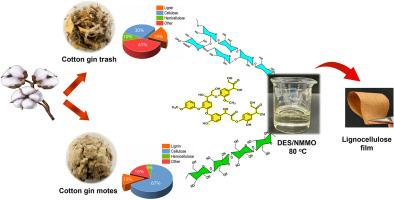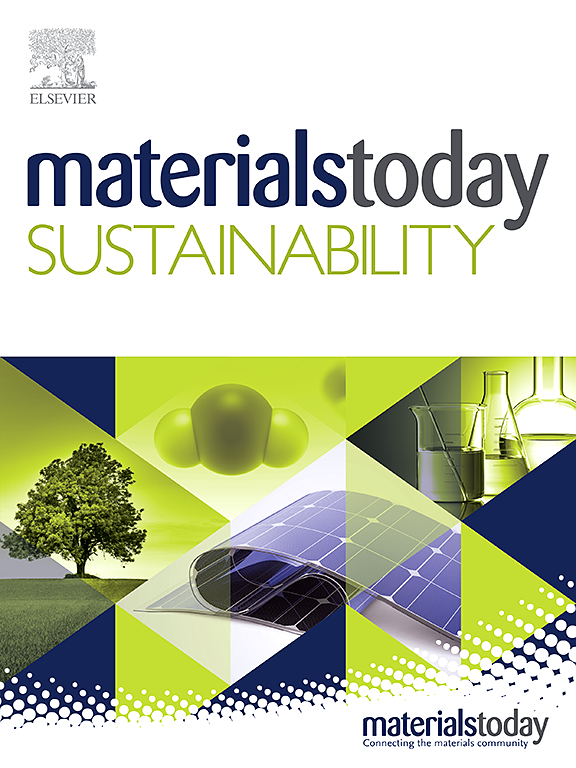Upcycling cotton gin byproducts into bioplastics: A sustainable approach to Co-dissolution of lignin and cellulose using a DES/NMMO binary solvent
IF 7.9
3区 材料科学
Q1 GREEN & SUSTAINABLE SCIENCE & TECHNOLOGY
引用次数: 0
Abstract
In this work, a sustainable and efficient approach was developed to address the challenges associated with the dissolution of the entire biomass lignocellulosic components. This was carried out using a deep eutectic solvent (DES) and N-methylmorpholine N-oxide (NMMO), together as a binary solvent system for direct dissolution and film fabrication of cotton gin trash (CGT) and cotton gin motes (CGM), two underutilized agricultural residues. The DES facilitated the selective dissolution of lignin and hemicellulose, while NMMO effectively dissolved crystalline cellulose. The synergistic action of DES and NMMO enabled efficient co-dissolution of lignin, hemicellulose and cellulose without fractionation. XRD and 13CNMR confirmed a transition from crystalline cellulose structure to a more amorphous network in the regenerated films, particularly in CGT-rich compositions. The films showed enhanced thermal stability, with the 1:1 CGT/CGM blend film exhibiting the highest onset temperature. The mechanical testing indicated that the 1:1 CGT/CGM blend films achieved an optimal balance between tensile strength and flexibility through combining CGM's crystalline cellulose reinforcement with CGT's amorphous lignin and hemicellulose content. This study demonstrates the potential of CGT and CGM as sustainable raw materials and the proposed DES/NMMO system as an effective green solvent for processing whole lignocellulosic biomass into high-value-added products.

将轧棉机副产品升级为生物塑料:利用DES/NMMO二元溶剂实现木质素和纤维素共溶的可持续方法
在这项工作中,开发了一种可持续和有效的方法来解决与整个生物质木质纤维素成分溶解相关的挑战。采用深度共晶溶剂(DES)和n -甲基啉n -氧化物(NMMO)作为二元溶剂体系,对两种未充分利用的农业残留物轧棉渣(CGT)和轧棉渣(CGM)进行直接溶解和成膜。DES有利于木质素和半纤维素的选择性溶解,而NMMO则能有效溶解结晶纤维素。DES和NMMO的协同作用使木质素、半纤维素和纤维素在不分离的情况下有效共溶。XRD和13CNMR证实,再生膜从结晶纤维素结构转变为更无定形的网状结构,特别是在富含cgt的成分中。CGT/CGM共混膜表现出较高的热稳定性,其中CGT/CGM共混膜的起始温度最高。力学性能测试表明,CGM的结晶纤维素增强与CGT的无定形木质素和半纤维素含量相结合,使CGT/CGM 1:1共混膜的拉伸强度和柔韧性达到了最佳平衡。本研究证明了CGT和CGM作为可持续原料的潜力,以及所提出的DES/NMMO体系作为将整个木质纤维素生物质加工成高附加值产品的有效绿色溶剂的潜力。
本文章由计算机程序翻译,如有差异,请以英文原文为准。
求助全文
约1分钟内获得全文
求助全文
来源期刊

Materials Today Sustainability
Multiple-
CiteScore
5.80
自引率
6.40%
发文量
174
审稿时长
32 days
期刊介绍:
Materials Today Sustainability is a multi-disciplinary journal covering all aspects of sustainability through materials science.
With a rapidly increasing population with growing demands, materials science has emerged as a critical discipline toward protecting of the environment and ensuring the long term survival of future generations.
 求助内容:
求助内容: 应助结果提醒方式:
应助结果提醒方式:


